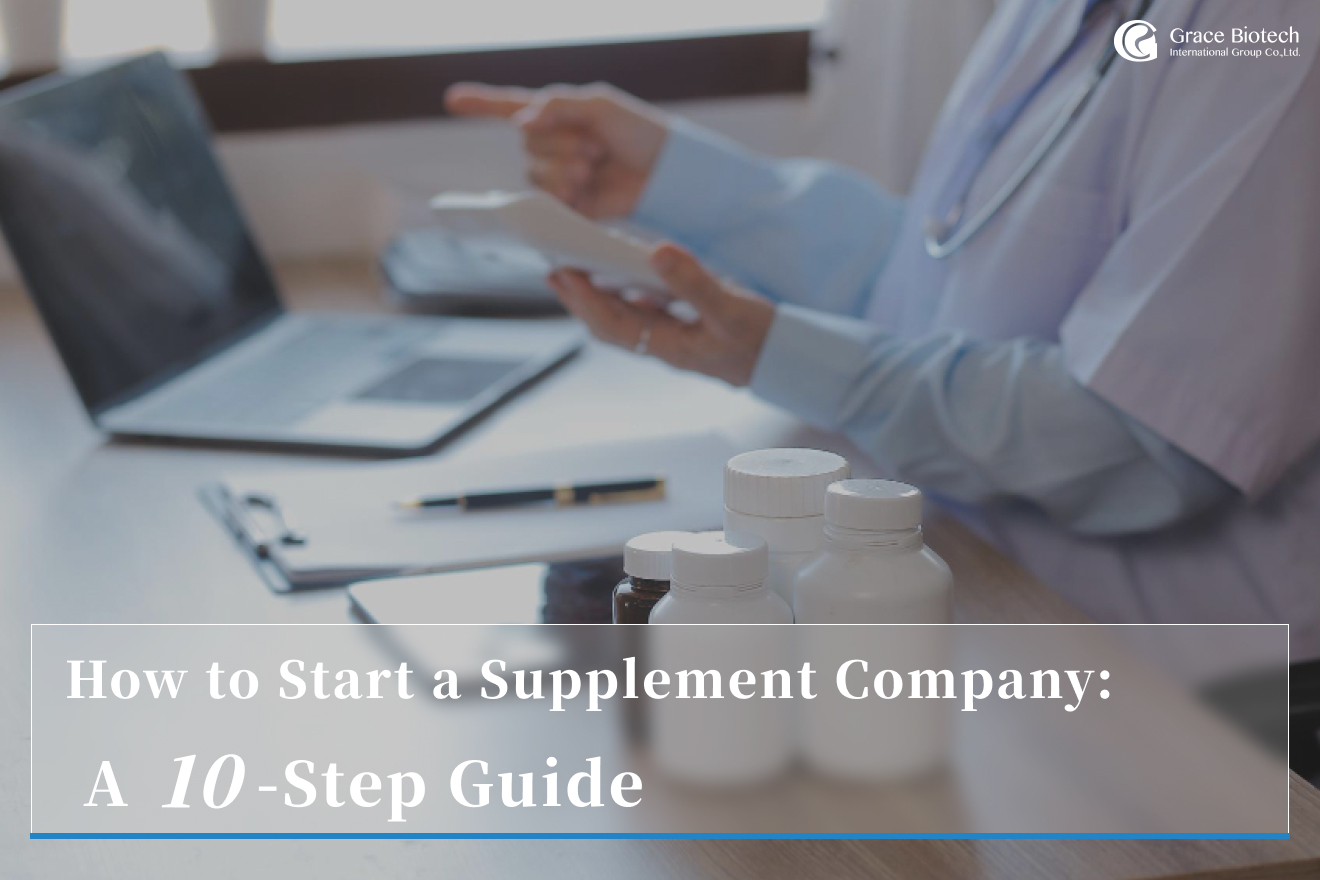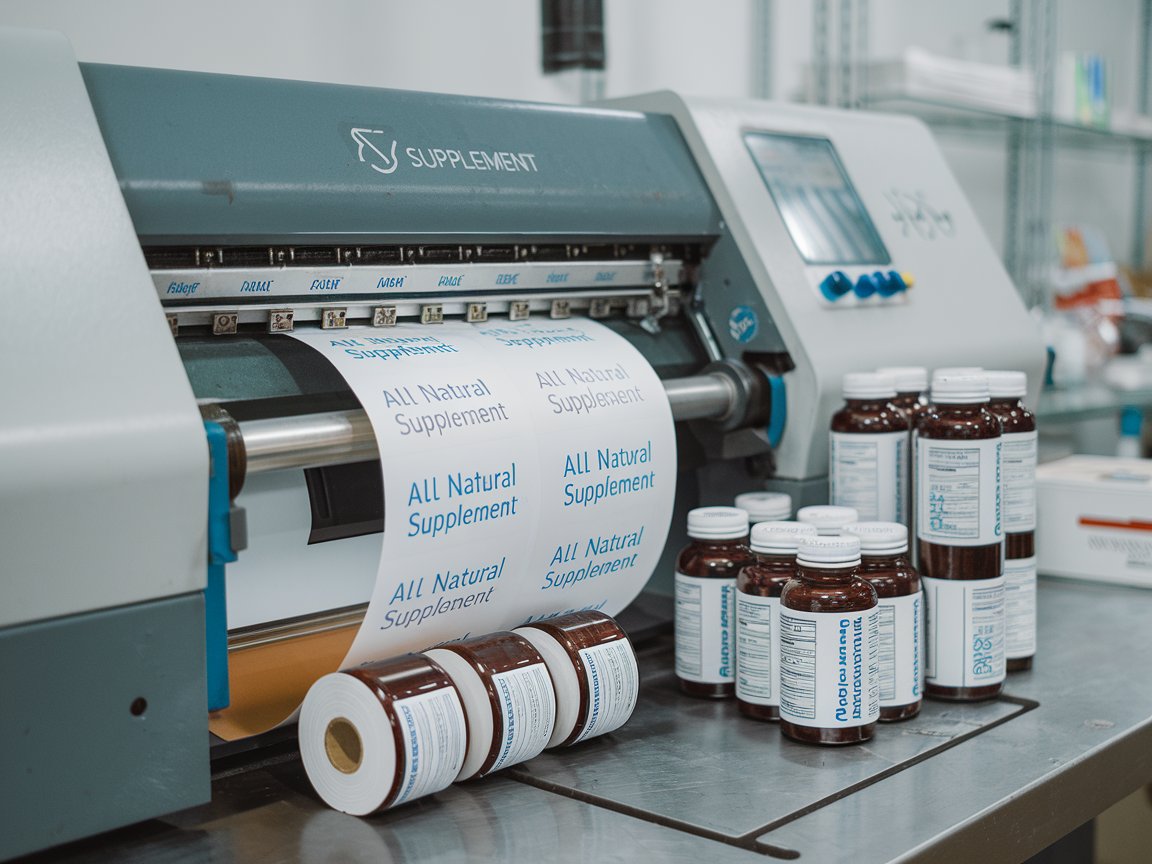Latest
News
How to Start a Supplement Company from Scratch: 10 Steps

Wondering how to start a supplement business? This article will guide you through the 10 key steps, from market research, manufacturing, to advertising.
The hectic schedules in our modern lifestyles can make it difficult to get all the nutrients our bodies need. This is where supplements come in, as they offer a convenient and effective way to bridge nutritional gaps and support our overall health.
With the public growing more conscious of maintaining their well-being, the demand for supplements has been steadily increasing in recent years. According to a report by Grand View Research, the global supplements market size has reached an estimated value of $177.50 billion in 2023 and it is expected to reach $327.42 billion by 2030, growing at a CAGR of 9.1% as people seek effective solutions to support their health goals, whether it’s for pre-workout nourishment, weight management, or replenishing vitamins and minerals.
Step 1. Conduct Market Research
By conducting thorough market research, you can gain valuable insights into your target market, competitors, and the overall supplement industry. This information is crucial for making informed decisions about product development and your overall business direction.
Identify Your Niche
To begin, identify your niche by determining the specific demographic or health concern you want to target with your supplement. Consider the following questions to better refine your focus:
-
Age Group: Who are you trying to reach? Children, adults, or the elderly?
-
Health Concern: Which health issue resonates with you? Pregnancies, hangovers, or mineral deficiencies?
-
Lifestyle: Which lifestyle are you interested in supporting? Those of athletes, vegans, or fatigued students/workers?
Choosing a specific niche makes everything easier and more effective, allowing you to design a supplement that truly hits the mark! Once you've pinpointed your area of focus, you're well on your way.
Conduct Consumer Research
Market research helps you understand the target audience's needs, preferences, and buying habits. Immersing yourself in your audience with these approaches:
-
Surveys and Questionnaires: Craft targeted surveys using SurveyMonkey or Google Forms. Ask direct questions about their health goals, challenges, and preferred ingredients. Remember to offer incentives for participation!
-
Google Trends: Chart trends through search engines to explore the popularity of health topics and ingredients in your niche. For example, the sustained interest in magnesium supplements, evidenced by hundreds of monthly searches and a significant year-over-year increase, provides actionable insights for businesses. Analyzing search data on Google Trends is a valuable way to understand consumer behavior in the established health products market.

- Social Media Listening: Set up alerts using tools like Mention or Brandwatch to monitor conversations related to your niche. Look for pain points and unmet needs.
With this exploration completed, you'll have a solid foundation for creating a supplement that truly speaks to your audience.
Evaluate the Competition
You should also evaluate the competition by analyzing their strengths, weaknesses, and market positioning. Dig into them using these tactics:
-
Key Competitors: Identify at least 5-10 of the main players in your niche and create a list.
-
SimilarWeb: Analyze their website traffic, sources, and demographics for insights into their online strategies.
-
SEMrush: Investigate their SEO strategies, including keywords, backlinks, and ad campaigns.
-
Unmet Needs Analysis: What aren’t your competitors offering? Is there a demand for clean ingredients, specific dosages, or unique delivery methods?
On top of that, you can also think of the following questions to conduct analysis:
-
Analyze price: What do your competitors charge?
-
Analyze marketing: How do your competitors reach their target market?
-
Analyze customers: What customers do your competitors target?
-
Analyze claims: What claims (and disclaimers) do your competitors include on the labels?
By understanding what's already out there, you can position your supplement for success and carve out a unique space in the market.
Stay Updated on Industry Trends
Most importantly, always stay updated on industry trends. You can do this by monitoring industry news and publications, or attending industry events such as trade shows and exhibitions. This will help you stay informed about the latest regulations, consumer preferences, and emerging developments that could impact your business.

Source: Ideogram
Step 2. Select the Right Products for Your Supplement Brand
Next, it's time to select the specific supplement products you want to offer. The supplement industry is vast, with a wide range of products available to cater to different health requirements. By focusing on a niche, you can develop product ideas based on their needs and preferences, increasing your chances of building a strong customer base.
Common types of supplement products include:
-
Multivitamins that offer a convenient way to address potential nutritional gaps and provide a daily dose of essential vitamins and minerals, such as iron, calcium, or vitamin B.
-
Dietary supplements like collagen that promote skin elasticity or fiber supplements that have potential digestive health benefits.
-
Workout supplements that enhance athletic performance and recovery when paired with a proper workout routine. For example, protein shakes and BCAA.
-
Probiotics that support the microbiome within the digestive system.
-
Meal replacements that provide a convenient to consume food are ideal for individuals who are busy or managing weight, even for those who follow a plant-based diet.
Recently, most entrepreneurs have also tapped into the trend of ready-to-drink (RTD) liquid supplements. Not only can this supplement format be easily absorbed by the human body, but it also eliminates the need for preparation, making it ideal for busy individuals who struggle to find time for traditional supplement regimens. Its growing popularity is reflected in the market's expansion. According to Grand View Research, the global liquid supplements market was valued at $21.56 billion in 2023 and this figure is projected to grow at a CAGR of 11.6% over the forecast period from 2024 to 2030.
Regardless of the products you choose, it’s essential to focus on the quality of the supplements. Make sure your products meet high-quality standards and comply with all relevant regulations. What’s legal in your region may be banned in other states or countries, so you should review any relevant laws within your target market as you make your choice

Source: Ideogram
Step 3. Develop a Brand Identity
Your brand identity which encompasses the brand name, logo, messaging, and overall aesthetic, should project the unique personality and image of your supplement company. With a strong brand identity, you can connect with your target audience and build a presence within the competitive market.
The brand name is the first impression your customers will have of your company. It should be memorable, relevant, and reflective of your brand's values. When choosing a brand name, consider keeping it short and simple, so that it is easy to remember. You should also make sure it is relevant to your product line and target market, but avoid names that are too similar to existing brands or those that have negative implications. Once you have a rough idea, conduct a trademark search to ensure your chosen name is available and prevent legal issues.
Furthermore, your logo is equally important as it serves as the visual representation of your supplement brand. It should be visually appealing, memorable, and consistent with your brand's overall aesthetic. Keep it clean and uncluttered for a more attractive look, also try designing it to look good in various sizes and formats so that it has versatility for digital and printed applications. Its color palette should match your brand's personality and evoke the emotions you are aiming for.
After you finalize your brand name and logo, register your trademark with the United States Patent and Trademark Office (USPTO) or any relevant parties in your region. This will be a protective measure against infringement, as you will gain exclusive rights to use, license, or sell your brand, preventing others from using it without your permission.

Source: Ideogram
Step 4. Create a Business Plan to Guide Your Supplement Company
A business plan serves as a roadmap, outlining your company's missions, strategies, and financial projections to help you stay focused on long-term goals. Key components include:
-
Executive Summary: A concise overview of your business and overall strategy.
-
Market Analysis: A detailed analysis of your target market, including their demographics, relevant trends, and competition.
-
Product Description: A comprehensive description of your supplement products, including their unique selling points and benefits.
-
Marketing and Sales Strategy: Your plan for promoting and selling your products.
-
Operations Plan: A description of your company's operations, including manufacturing processes, supply chain management, and inventory control.
-
Financial Projections: Your projected income statement, balance sheet, and cash flow statement.
-
Funding Requirements: An outline of the funding you need to start and operate your business.
When developing your financial plan, consider the startup costs required to start your business. This may involve product development, manufacturing, marketing, and legal fees. Usually, entrepreneurs might estimate $10,000 for initial product orders, $5,000 for marketing, and $2,000 for legal fees. You should also calculate your ongoing expenses, such as rent, utilities, salaries, and marketing costs to make a comprehensive estimate.
You can either fund the business on your own or seek help through loans, investments, and crowdfunding campaigns. If your supplement company requires external funding, you will need to write your business plan as a formal document to pitch to investors or banks. The business plan itself will have to be detailed yet concise in order to attract investor and gain their trust.
 Source: Ideogram
Source: Ideogram
Step 5. Step Up Your Supplement Company Legally
This process involves choosing a legal structure, registering your company, and applying for necessary documents. The legal structure you choose will determine your company's tax liabilities, liability protection, and ownership structure. The most common legal structures for supplement companies are sole proprietorships, partnerships, limited liability companies (LLCs), and corporations.
Once you've chosen a legal structure, you'll need to register your business with your state government. This typically involves filing articles of organization or incorporation, paying fees, and obtaining a business license.
Depending on your location and the specific nature of your business, you may need to obtain additional licenses and permits. These can include Federal Food, Drug, and Cosmetic Act (FDCA) registrations, Good Manufacturing Practices (GMP) certifications, as well as state and local permits for operating a business. For more details, you can refer to the Small Business Administration's official website.

Source: Freepik
Step 6. Get in Touch with a Manufacturer
Now, it's time to find a reputable manufacturer or supplier to obtain products for your supplement company. Channels to find supplement manufacturers include online product sourcing platforms (e.g. Alibaba, Thomasnet, etc,) and industry associations directories (e.g. United Natural Products Alliance, Council for Responsible Nutrition, etc.) You can even attend industry events such as trade shows and conferences, or ask for recommendations from other supplement companies to find potential collaborators.
There are two main options for you to work with these manufacturers and suppliers, either through contract manufacturing or private labeling.
Custom Production(Contract Manufacturing)
Contract manufacturing allows you to hire a manufacturer to produce supplements to your specifications. This gives you more control and lets you customize products with unique formulas.
You work with a formulator to create a unique product, from ingredients to packaging. Opt for branded, organic, or vegan components to make distinct claims. This customization distinguishes your brand and increases its potential for success.
However, contract manufacturing supplements mean higher MOQs and costs. Creating a custom product is meticulous and takes time. Furthermore, registering entirely new products may face hurdles depending on your country's regulations.
Advantages:
-
Complete ingredient choice.
-
Saves costs on equipment and labor.
-
Guarantees quality with certified manufacturers.
-
Easily adjusts production to meet demand.
-
Speeds up production with established supply chains.
Disadvantages:
-
Increased risk of design or formula copying.
-
Longer lead times.
-
Higher minimum order quantities.
Ready for Sale (White Label)
For startups seeking a cost-effective and rapid market entry, purchasing ready-to-sell supplements and adding your brand label can be an attractive option. These pre-manufactured products, such as pots, tubs, or pouches, require only your branding to become market-ready. With low minimum order quantities and significantly shorter lead times, often within a week, you can quickly launch your product without investing in manufacturing facilities.
However, it's important to note that ready-to-sell supplements offer limited customization in ingredients. Thus, to differentiate your brand, a robust marketing strategy is crucial. Furthermore, due to their pre-manufactured nature and storage prior to sale, these supplements tend to have shorter best-before dates than contract-manufacturing products.
Advantages:
-
Brand control over packaging and pricing.
-
Faster market entry with existing products.
-
Proven quality due to established formulas.
-
Low MOQs making it more budget-friendly.
Disadvantages:
-
Limited customization of product formulations.
-
High competition due to similar products.
-
Shorter best-before dates from pre-made inventory.
Tips to Choose Your Manufacturer
Whichever method you choose, it is important to find a reputable supplier or manufacturer that will help you bring your supplement products to market successfully. Here are some factors you have to consider to select the right supplier/manufacturer:
-
Minimum Order Quantities (MOQs): Most manufacturers have minimum order quantities to ensure cost-efficiency. Startups with small initial runs may need to find a manufacturer with lower MOQs, while companies that anticipate high volume right away can choose manufacturers with higher production volume. This can help you avoid getting stuck with excess or insufficient inventory during retail.
-
Supplement Manufacturing Cost: The cost of manufacturing supplements can vary depending on factors such as the complexity of the formula, the ingredients used, and the production volume. It's important to get quotes from multiple manufacturers and compare costs to ensure alignment with your budget. It is also important to make sure the cost is broken down clearly in the quotes to avoid hidden fees.
-
Manufacturer Certifications and Regulatory Compliance: Look for manufacturers with certifications and relevant regulatory compliance, such as ISO or FSSC for food safety. This ensures that your product meets the highest safety and quality standards, fostering consumer trust and reducing the risk of legal issues.
-
Production Capabilities: Evaluate a manufacturer's turnaround time to ensure that they can meet your production deadlines. You should also make sure that they have the equipment and flexibility to adapt to the potential growth in your business.
-
Quality and Expertise: Choose a manufacturer with expertise in product development and testing. This can help ensure your product delivers the intended benefits and maintains exceptional quality.
-
Customer Service: Open communication and reliable support are essential for a smooth collaboration, so it is advised for you to choose a manufacturer who prioritizes clear communication throughout the process and readily addresses your questions or concerns.

Source: Ideogram
Step 7. Produce Your Supplements
After establishing a partnership with your chosen supplement manufacturer, the production process can begin. This usually starts with formulation, which involves determining the specific ingredients and dosages to be used in your supplement. The manufacturer will then source raw materials based on the expected nutrient profile and functionalities of your product.
Subsequently, the ingredients will be blended in the correct proportions to create the formula and processed into your desired product format, whether it’s a beverage supplement, powder, capsule, or something else.
Throughout the production process, manufacturers will monitor the consistency and quality of your products. The final product will also undergo comprehensive testing to verify it has the right nutrient content, potency, viscosity, pH value, microbiology, moisture, etc, ensuring its stability and efficacy.

Source: Ideogram
Step 8. Design the Packaging and Label
Create an eye-catching packaging design that stands out on the shelf and sets you apart from your product from competitors. Similar to the brand logo, it should align with your brand's personality and messaging to establish a deeper connection with your target market.
Additionally, the quality of your packaging material matters as well, since it will influence the supplement’s shelf life and overall stability. Your product should be protected against light, moisture, and oxidation, which can degrade its effectiveness.
You can also consider using eco-friendly materials and minimizing packaging waste to demonstrate your commitment to sustainability and appeal to environmentally conscious consumers. Partner with manufacturer like Grace Biotech to access recyclable tin can packaging for your supplement products. These tin cans are fire-resistant, durable, and have high opacity, ideal for maintaining the integrity of your supplements.
On top of that, you should ensure that your supplement labels comply with all relevant FDA regulations. This usually requires you to include the ingredient listing, net weight, as well as nutrition facts like serving size, calories, and amounts of nutrients.
Moreover, product claims must be supported by scientific evidence. So, research your products thoroughly and avoid making claims that are misleading or exaggerated. For more information on regulations about product claims and labeling, please refer to the following websites:

Source: Ideogram
Step 9. Develop a Sales and Distribution Strategy
With your product manufactured and packaged, the next step is to create a sales strategy by setting prices for your supplements and selecting a sales channel. This is crucial for reaching your target market and maximizing your sales potential.
The price of your products should be competitive yet profitable, ensuring you cover your production costs and achieve a reasonable profit margin. By researching similar products on the market, you can grasp the average pricing and understand the perceived value of your product, helping you set a reasonable price that can generate sales.
Once you've determined your pricing strategy, it's time to select the appropriate sales channels to reach your target market. Partnering with retailers such as health food stores, pharmacies, and grocery stores can provide a physical presence and reach a wider audience, but it may involve negotiating shelf space and dealing with distribution costs. Conversely, selling your supplements online through your own website or e-commerce marketplaces like Amazon can offer higher flexibility and lower overhead costs, though it requires greater online marketing and customer service efforts.
You can also consider taking a hybrid approach to maximize your reach and revenue. For example, you could sell your supplements both online and through physical stores, or set up your supplement store on multiple e-commerce channels. This can help you diversify your customer base and reduce your reliance on any single channel.
If aren’t sure which e-commerce platform is best for your supplement business, you can check out our article to learn about their features, costs, and learning curve: How to Sell Supplements Online

Source: Freepik
Step 10. Promote Your Supplements
To promote your supplements and expand your reach to potential customers, you must plan a marketing strategy. Popular ways to promote supplements include search engine optimization (SEO), social media, email marketing, paid advertising, influencer collaborations, and more.
-
Search Engine Optimization (SEO): To improve your search engine ranking and attract organic traffic, optimize your website for relevant keywords. Create high-quality content, such as blog posts and articles, that provides valuable information to your target audience.
-
Social Media: Utilize social media platforms like Facebook, Instagram, or TikTok to showcase your products and interact with your audience with engaging content, such as posts, images, and videos. You can also encourage user-generated content by running contests or giveaways to foster customer engagement and loyalty.
-
Email Marketing: Build an email list of subscribers and send regular newsletters with product updates, promotions, and valuable content to drive conversions. You can personalize your email campaigns to target specific segments of your audience and increase engagement even further.
-
Paid Advertising: Consider using paid advertising platforms like Google Ads or Meta Ads to reach a wider audience. Target your ads to specific demographics, interests, and behaviors to ensure maximum effectiveness. These platforms also allow you to track the performance of your ads and measure their impact, fostering data-driven decisions as you optimize your campaigns.
-
Influencer Collaboration: Partner with influencers in your niche to promote your products to their followers. Choose influencers who align with your brand values and resonate with your target audience. Then, provide these influencers with samples of your products and clear guidelines for their promotion to market your supplements effectively.
-
Public Relations: Try reaching out to media outlets to generate press coverage for your brand and products. Develop comprehensive media kits with all the important product details for press releases. You can also choose to offer samples of your supplements to media outlets for review, allowing them to promote your product using their own thoughts and diversify your advertising campaign.

Source: Freepik
Partner with a Trusted Supplement Manufacturer to Start Your Company
We hope this guide has helped you understand the necessary steps for starting a supplement company. Remember that managing your own supplement brand requires ongoing efforts. Continuously monitor your products and marketing strategies, and always be prepared to make adjustments as needed.
Plus, the supplement industry is highly regulated, so staying compliant with current regulations is crucial. Partnering with a reputable manufacturer can help you ensure compliance and reduce legal risks as your supplement brand grows.
As a trusted custom-label supplement manufacturer that specializes in ready-to-drink supplements, Grace Biotech understands how product quality and safety are of the utmost importance. Not only do we offer all-in-one private label manufacturing services to streamline your operations, but we also have rigorous licensing and testing procedures to ensure product integrity.
Our team of experts will maintain clear communication throughout the manufacturing process, from formula development, raw material sourcing, to production, and shipment, working closely with you to create unique, high-quality products that meet your vision. Partner with Grace Biotech today to kickstart your supplement company!
You May Also Be Interested In:

